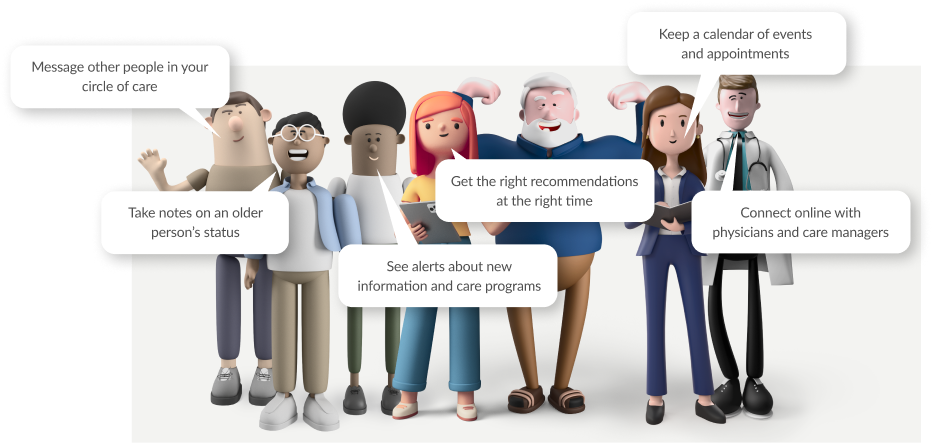Engaging an attorney
Summary
Engaging an attorney or lawyer is a helpful step for anyone planning for their elder years and end of life. This article lists what kinds of attorneys are best for elder-care planning and how to find a good attorney.
Why should a person hire an attorney?
Engaging an attorney or lawyer is a helpful step for anyone doing estate- or end-of-life planning. Certain elements of this kind of plan, such as setting up trusts, are only valid if they are done by a lawyer.
In addition, many people will choose to use a lawyer to create or consult on a will and help them with overall estate planning.
What kinds of attorneys can help with elder-care planning?
There are two kinds of specialist lawyers who are the most suitable for estate and end-of-life planning: estate-planning lawyers and elder-care attorneys. It is worth noting that not all states allow lawyers to name a special area of practice.1
Estate-planning lawyers
Estate-planning lawyers have special expertise and experience in preserving a person’s wealth and legacy. Their areas of special knowledge include taxes, trusts, wills, and probate procedures. Some of the documents they may help a person create are a last will and testament, a living trust and other kinds of tax-minimizing trusts, and advance health care directives.
Estate-planning lawyers may have extra credentials in addition to their law degree and legal license. They may be members of a professional college such as the American College of Trust and Estate Counsel, which shows a focus on this area of law. They could also have certifications like Accredited Estate Planner, Chartered Trust and Estate Planner, or Certified Trust and Financial Advisor. However, these certifications are not necessary for the attorney to be an estate-planning specialist, and a person does not need to be a lawyer to hold them.2
Elder-care attorneys
Elder-care attorneys, also called senior-law attorneys, handle the whole range of legal and financial issues connected to a person’s elder years. These include power of attorney, advance directives, incapacity planning, Medicare and Medicaid planning, guardianship, Social Security law, and elder abuse. Like estate-planning lawyers, they also specialize in taxation, wills, and trusts. Another important area that an elder-care attorney will usually help with is managing the cost of long-term care.
Many elder-care attorneys will belong to the National Academy of Elder Law Attorneys (NAELA), a national non-profit organization for lawyers who specialize in elder- and special-needs law. This group is a valuable resource for information about elder law.
How can I find a good attorney?
Three effective ways to find a suitable attorney are word of mouth, lawyer referral services, and online directories.
Word of mouth
Often the best way to find a good attorney is to ask friends and family members if they know of one. It is a good idea to ask specific questions about why they like the lawyer, what kind of work was done, and what kind of experiences they had. Different people like different styles of communication and interaction, so what one person considers professional and efficient might strike someone else as overly cool and unapproachable.
It is ideal if the lawyer works directly in the area of elder law, but those with expertise in estate planning or other relevant areas can also give effective service. In addition, financial advisers or other lawyers themselves can often recommend lawyers with relevant experience and expertise.
Lawyer referral services
Lawyer referral services are non-profit groups at the state, county, and city level, which have a list of qualified attorneys with different areas of specialization. Often these groups are associated with the area’s bar association, which is the professional association of lawyers. However, some referral services are created by other non-profit groups, such as advocacy and public-health organizations.
Referral services can provide many benefits, including
- A guarantee that the lawyer is qualified to practice in your state—important because estate-related laws and legal forms differ widely from state to state
- A guarantee that the lawyer has no disciplinary complaints against them
- Lawyers who speak different languages
- Lawyers who specialize in different areas, such as elder law, nursing-home abuse, and taxation
- A phone intake session with a trained staff person to decide which kind of lawyer would be best for the job
- A low-cost consultation with the lawyer themselves.
Local chapters of the Area Agency on Aging, a nation-wide non-profit organization, may also be able to provide referrals to qualified and suitable attorneys.
Directories
There are many online directories for lawyers, law firms, and other legal-area services such as notaries (public officials who can act as formal witnesses to a signature). Some of the largest are Justia.com, Nolo.com, and HG.org. However, for those looking for lawyers specializing in estate and end-of-life planning, the best directory is probably the “Find a Lawyer” function of the National Academy of Elder Law Attorneys (NAELA). It lists only attorneys who specialize in elder law and special-needs law.
Related information
Advance directives
Creating legal documents
Decisions related to aging and the end of life
Durable power of attorney
Estate and inheritance taxes
Financial plans versus estate plans
Guardianship
Medical power of attorney
Overview of estate plans
Overview of legal documents
Overview of trusts
Using an online service
Will and testament
External supporting content
All About Hiring an Estate Planning Attorney
Estate Planning FAQs: The Lawyer’s Role
Find a Lawyer (The National Academy of Elder Law Attorneys (NAELA))
5 Smart Tips for Hiring an Elder Law Attorney
How Do I Know if a Lawyer is Right for Me?
Directory of Lawyer Referral Services
End notes
1 The Lawyer’s Role. American Bar Association.
2 All About Hiring an Estate Planning Attorney. SmartAsset.com
